



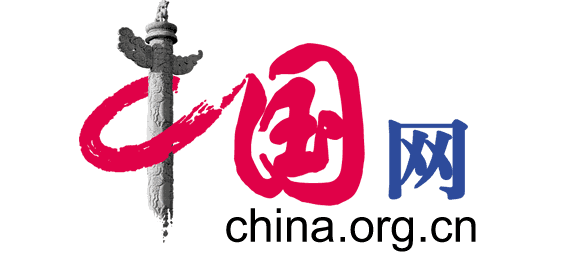

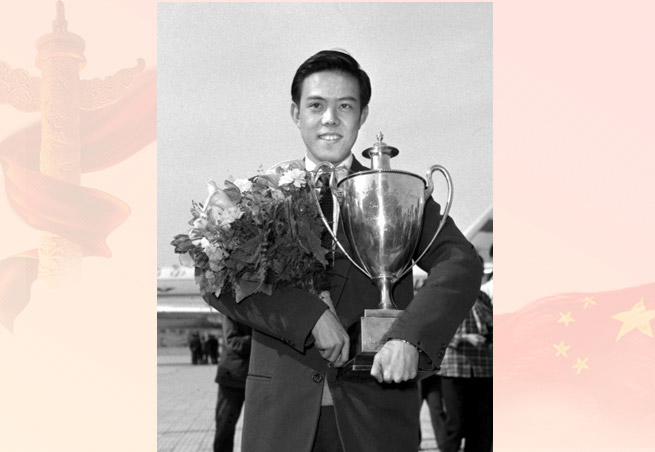 1Chinese table tennis player Rong Guotuan returns home after winning the men's singles title at the 25th World Table Tennis Championships in former West Germany in April 1959. When China was hungry for its first world title to celebrate the 10th anniversary of the founding of the PRC, Rong made that dream come true.
1Chinese table tennis player Rong Guotuan returns home after winning the men's singles title at the 25th World Table Tennis Championships in former West Germany in April 1959. When China was hungry for its first world title to celebrate the 10th anniversary of the founding of the PRC, Rong made that dream come true.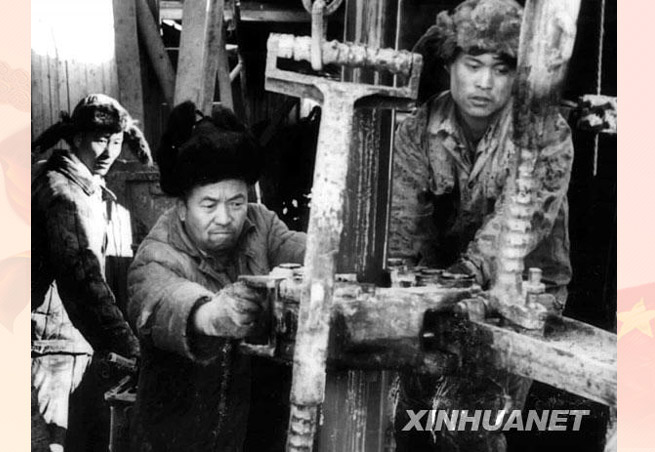 2Wang Jinxi, a team leader for drilling (also called "iron man" for his pioneering spirit), works with colleagues at the Daqing Oil Field in 1959. Later in 1963, Chinese Premier Zhou Enlai announced that China could meet its oil needs from growing domestic sources.
2Wang Jinxi, a team leader for drilling (also called "iron man" for his pioneering spirit), works with colleagues at the Daqing Oil Field in 1959. Later in 1963, Chinese Premier Zhou Enlai announced that China could meet its oil needs from growing domestic sources.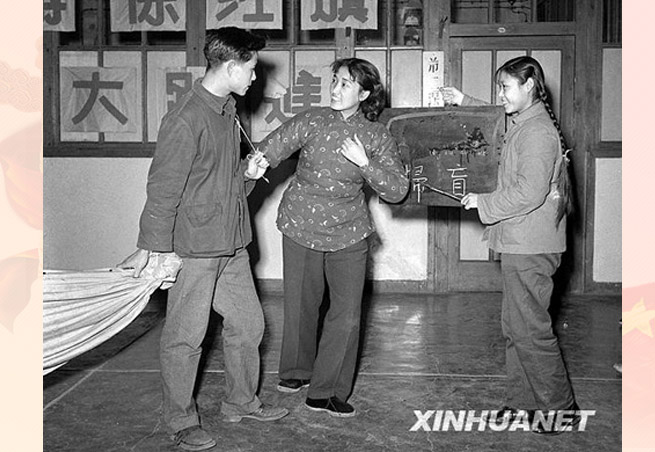 3Wu Fengyuan (center), an actress from the China Youth Art Theater, helps two workers rehearse an opera at the Beijing North China Wireless Joint Equipment Factory.
3Wu Fengyuan (center), an actress from the China Youth Art Theater, helps two workers rehearse an opera at the Beijing North China Wireless Joint Equipment Factory.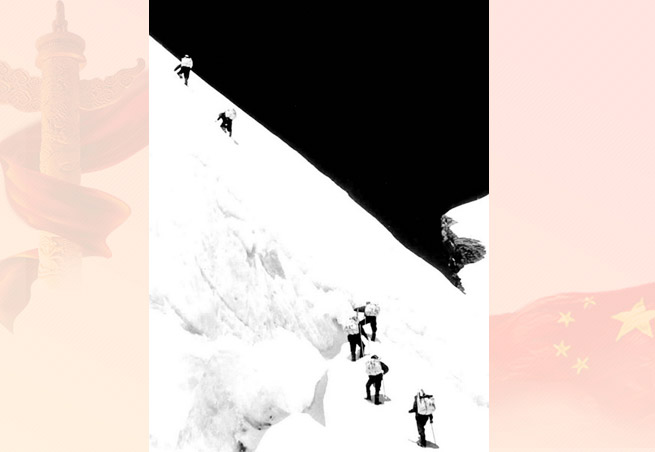 4On May 25, 1960, Chinese mountaineers Wang Fuzhou, Gongbu (Tibetan) and Qu Yinhua reached the top of Qomolangma, the highest peak in the world (8,848.13 meters), from its northern slope. The final assault took 19 hours for Chinese people to stand on top of the world for the first time.
4On May 25, 1960, Chinese mountaineers Wang Fuzhou, Gongbu (Tibetan) and Qu Yinhua reached the top of Qomolangma, the highest peak in the world (8,848.13 meters), from its northern slope. The final assault took 19 hours for Chinese people to stand on top of the world for the first time.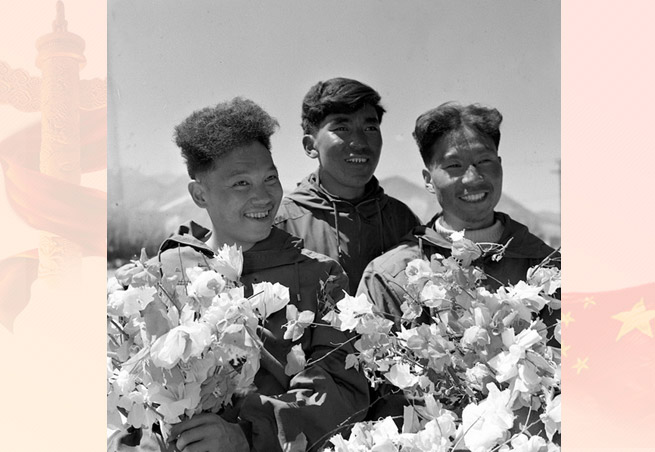 5On June 7, 1960, after reaching the top of Qomolangma two weeks earlier, Chinese mountaineers Wang Fuzhou (right), Gongbu (Tibetan) and Qu Yinhua (left) made a triumphant return to Lhasa, and were received warmly by local people of various ethnic groups there.
5On June 7, 1960, after reaching the top of Qomolangma two weeks earlier, Chinese mountaineers Wang Fuzhou (right), Gongbu (Tibetan) and Qu Yinhua (left) made a triumphant return to Lhasa, and were received warmly by local people of various ethnic groups there.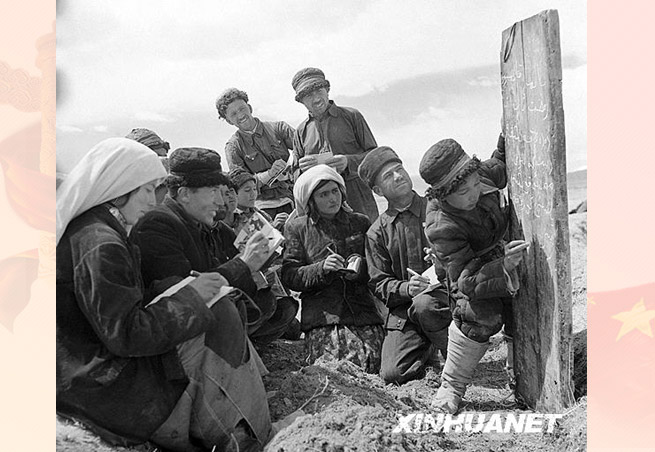 6In 1960, farmers from Taxkorgan Tajik Autonomous County in the Kashgar (Kashi) area of Xinjiang, learn to read and write from a primary student in the field.
6In 1960, farmers from Taxkorgan Tajik Autonomous County in the Kashgar (Kashi) area of Xinjiang, learn to read and write from a primary student in the field.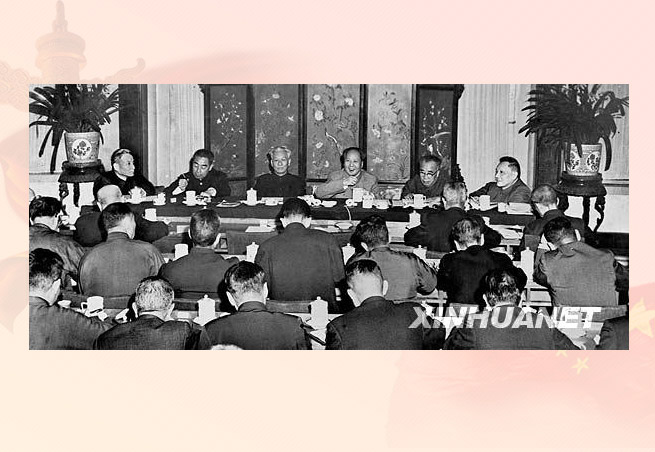 7At the Ninth Plenary Session of the Eighth Central Committee of the Communist Party of China (CPC) in early 1961,Chairman Mao Zedong appealed to the whole Party to practice a factual and realistic work style. From then on, the Chinese economy began to take a well-regulated road.
7At the Ninth Plenary Session of the Eighth Central Committee of the Communist Party of China (CPC) in early 1961,Chairman Mao Zedong appealed to the whole Party to practice a factual and realistic work style. From then on, the Chinese economy began to take a well-regulated road.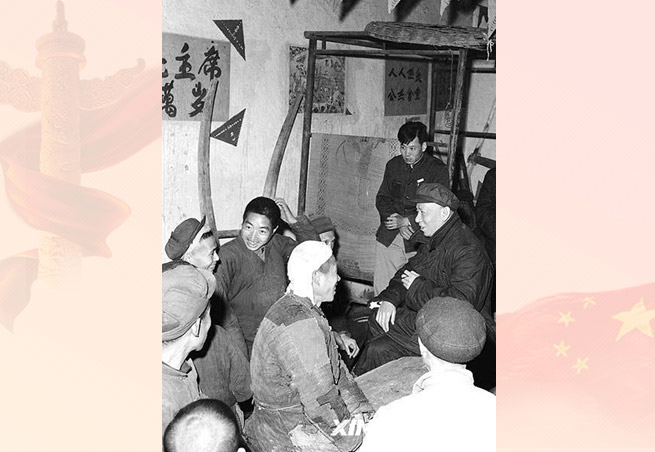 8On April 8, 1961, Vice Chairman Liu Shaoqi talked with local farmers while carrying out research and study work in Xiangtan County, Hunan Province.
8On April 8, 1961, Vice Chairman Liu Shaoqi talked with local farmers while carrying out research and study work in Xiangtan County, Hunan Province.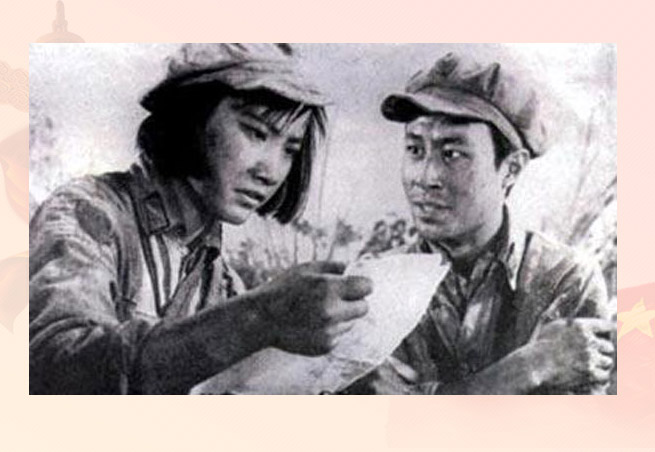 9A scene from the highly popular film "The Red Detachment of Women", which is considered one of the representative films directed by Xie Jin in his early period. The film depicts women's struggle for freedom and liberation. It won four prizes for best story, best director, best actress and best supporting actor at the First Hundred Flowers Awards in 1962.
9A scene from the highly popular film "The Red Detachment of Women", which is considered one of the representative films directed by Xie Jin in his early period. The film depicts women's struggle for freedom and liberation. It won four prizes for best story, best director, best actress and best supporting actor at the First Hundred Flowers Awards in 1962.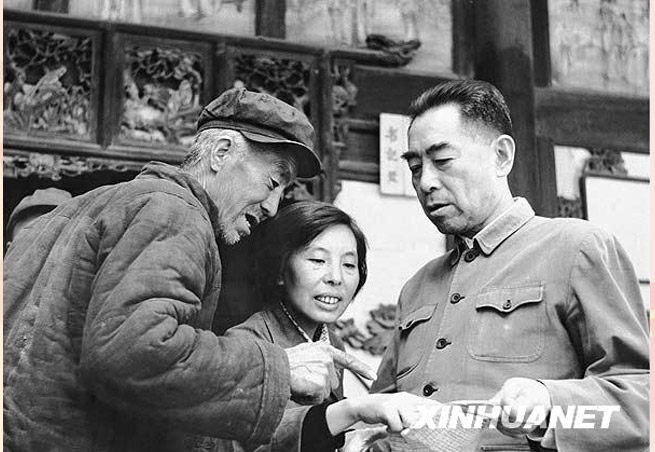 10Zhou Enlai talks with local farmers during his agricultural investigation and study tour of Wu'an County, Hebei Province on May 4, 1961.
10Zhou Enlai talks with local farmers during his agricultural investigation and study tour of Wu'an County, Hebei Province on May 4, 1961.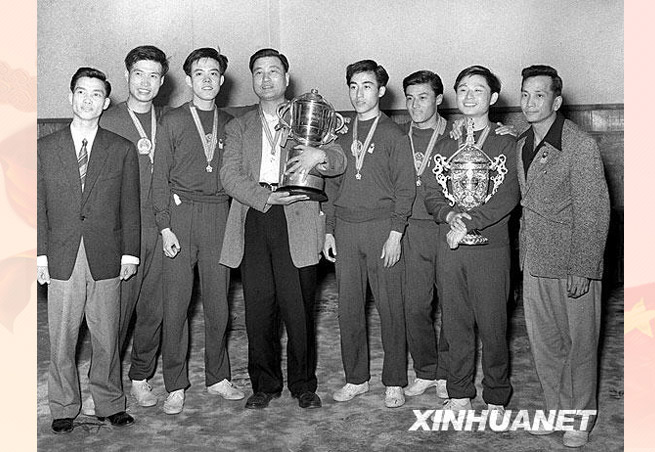 11The Chinese table tennis men's team (From left to right) Liang Youneng (instructor),Wang Chuanyao, Rong Guotuan, Fu Qifang (trainer), Zhuang Zedong, Li Furong, Xu Yinsheng and Jiang Yongning (trainer) with the Swaythling Cup, symbol of world supremacy, and a loving cup bestowed by the Chinese Table Tennis Association. China defeated Japan to win the team title at the 26th World Table Tennis Championships on April 9, 1961 in Beijing.
11The Chinese table tennis men's team (From left to right) Liang Youneng (instructor),Wang Chuanyao, Rong Guotuan, Fu Qifang (trainer), Zhuang Zedong, Li Furong, Xu Yinsheng and Jiang Yongning (trainer) with the Swaythling Cup, symbol of world supremacy, and a loving cup bestowed by the Chinese Table Tennis Association. China defeated Japan to win the team title at the 26th World Table Tennis Championships on April 9, 1961 in Beijing.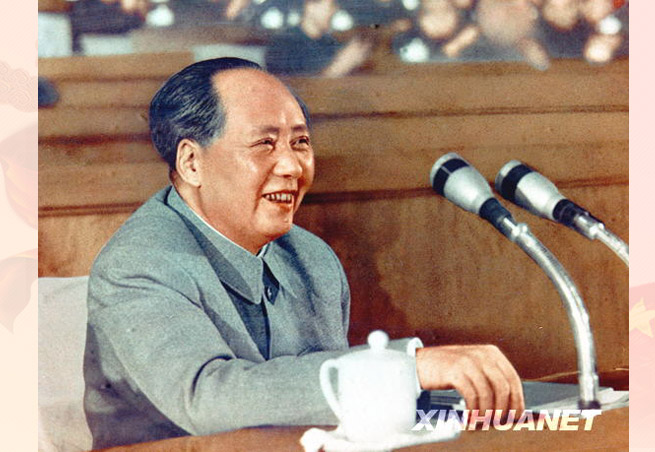 12In 1962, Chairman Mao Zedong made a speech at an enlarged meeting of the CPC Central Committee calling for adoption of extraordinary methods for solving the nation's financial difficulties.
12In 1962, Chairman Mao Zedong made a speech at an enlarged meeting of the CPC Central Committee calling for adoption of extraordinary methods for solving the nation's financial difficulties.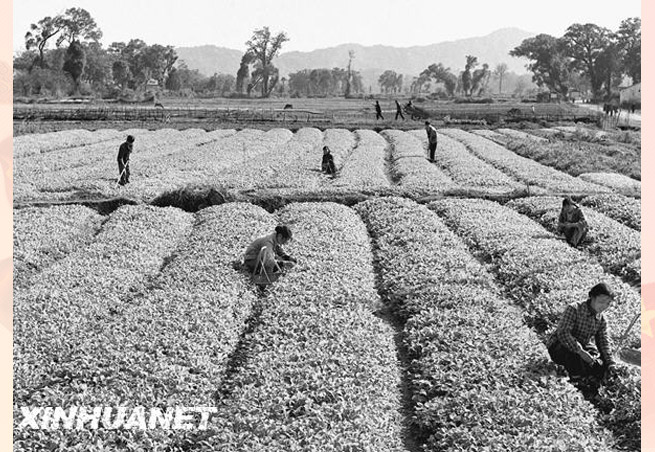 13Members of a production brigade in Jiangxi Province work in a field of cole in 1962.
13Members of a production brigade in Jiangxi Province work in a field of cole in 1962.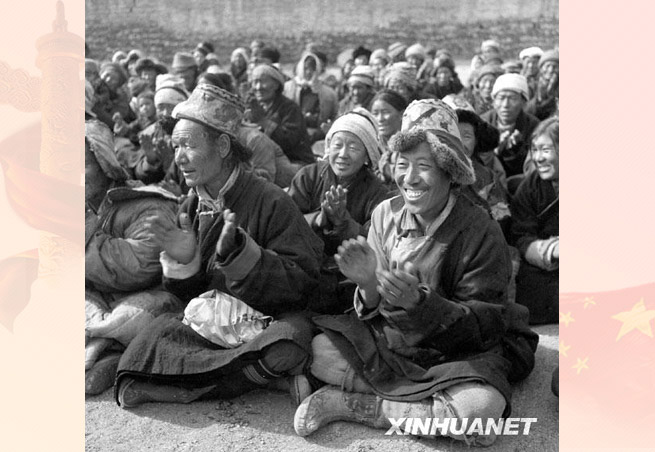 14At the election on December 20, 1962 in Tibet, residents from suburban areas of Lhasa applaud the election of their representative. China is a multi-ethnic country and Tibetans are among the many ethnic groups who have contributed greatly to national development.
14At the election on December 20, 1962 in Tibet, residents from suburban areas of Lhasa applaud the election of their representative. China is a multi-ethnic country and Tibetans are among the many ethnic groups who have contributed greatly to national development.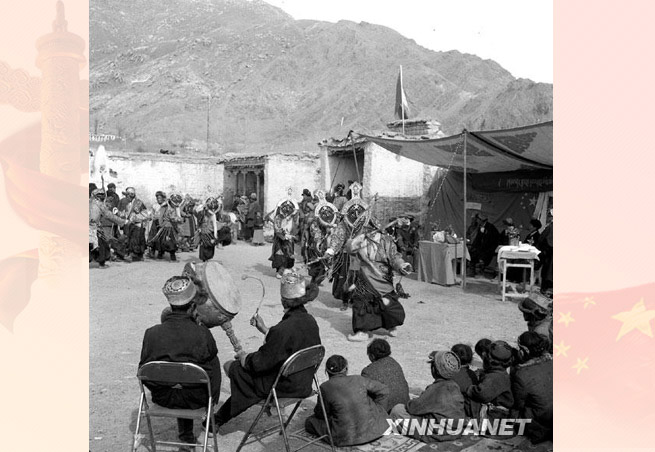 15After the general election in Tibet on December 20, 1962, suburban residents in Lhasa beat drums and gongs and dance to celebrate their representative's election. China is a multi-ethnic country and Tibetans are among the many ethnic groups who have contributed greatly to national development.
15After the general election in Tibet on December 20, 1962, suburban residents in Lhasa beat drums and gongs and dance to celebrate their representative's election. China is a multi-ethnic country and Tibetans are among the many ethnic groups who have contributed greatly to national development.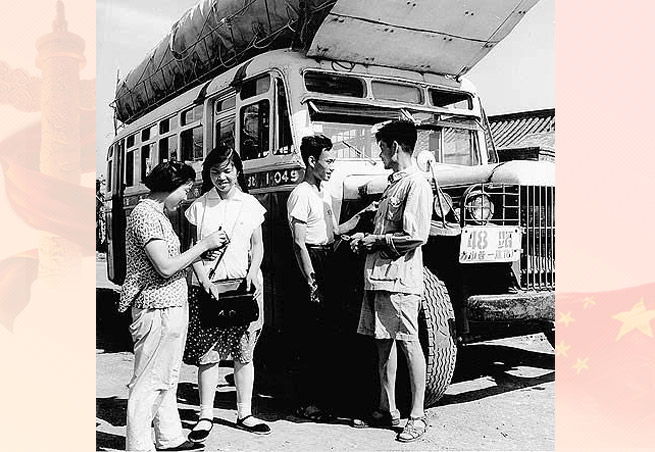 16In September 1963, young people from Beijing Vehicle Company pushed campaign to learn from Comrade Lei Feng. Lei Feng set a great example for generations by his faithful devotion to the Chinese Communist Party and people.
16In September 1963, young people from Beijing Vehicle Company pushed campaign to learn from Comrade Lei Feng. Lei Feng set a great example for generations by his faithful devotion to the Chinese Communist Party and people.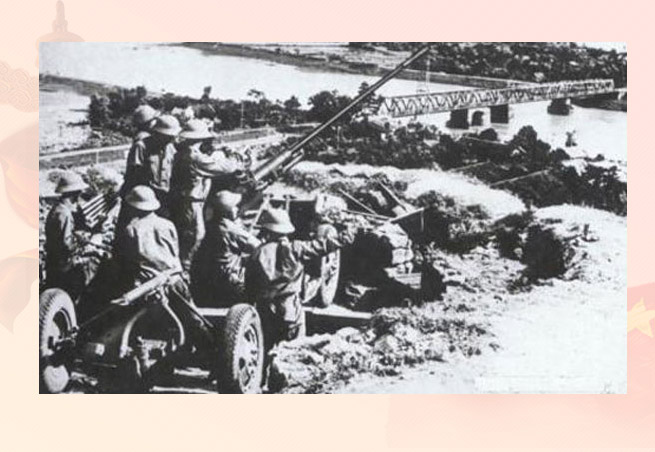 17Mao Zedong, chairman of the CPC Central Committee, stated on August 29, 1963 that China should help the Vietnamese fight against the United States because of its "ferocious invasion and massacre".
17Mao Zedong, chairman of the CPC Central Committee, stated on August 29, 1963 that China should help the Vietnamese fight against the United States because of its "ferocious invasion and massacre".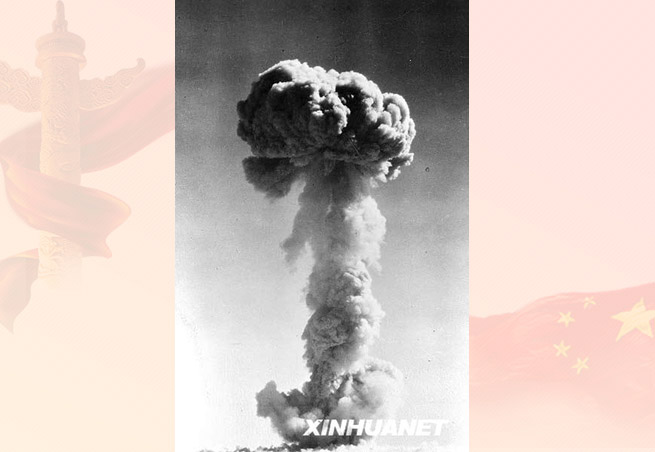 18The PRC joins the ranks of nations with an atomic bomb capability, after a successful nuclear test on October 16, 1964. China became the fifth member of the exclusive A-club after the United States, Soviet Union, Great Britain, and France.
18The PRC joins the ranks of nations with an atomic bomb capability, after a successful nuclear test on October 16, 1964. China became the fifth member of the exclusive A-club after the United States, Soviet Union, Great Britain, and France.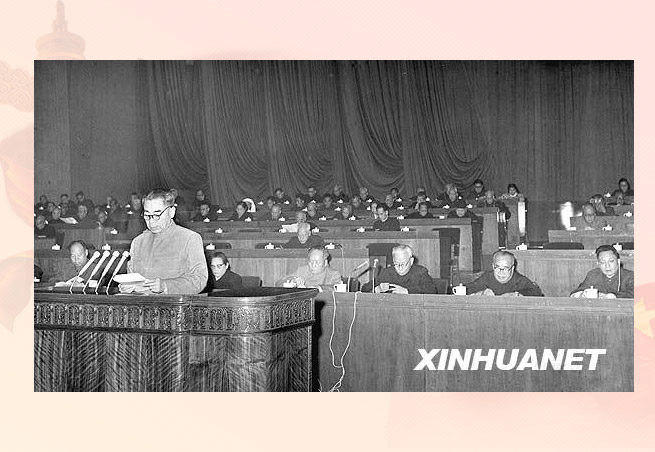 19Chinese Premier Zhou Enlai makes a report on government work at the first session of the third National People's Congress. The meeting was held in Beijing from Dec. 21, 1964 to Jan. 4, 1965. In his report Zhou formally stated a mission of "four modernizations" for the Chinese people – modernization of industry, modernization of agriculture, modernization of national defense and modernization of science and technology. And this became the watchword for construction of a new socialist country.
19Chinese Premier Zhou Enlai makes a report on government work at the first session of the third National People's Congress. The meeting was held in Beijing from Dec. 21, 1964 to Jan. 4, 1965. In his report Zhou formally stated a mission of "four modernizations" for the Chinese people – modernization of industry, modernization of agriculture, modernization of national defense and modernization of science and technology. And this became the watchword for construction of a new socialist country.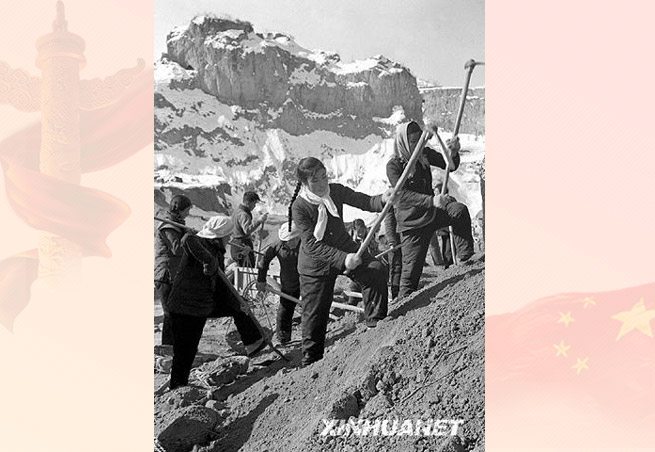 20In 1964, women farmers in the Dazhai production brigade, Shanxi Province, strived to turn barren hills into arable land.
20In 1964, women farmers in the Dazhai production brigade, Shanxi Province, strived to turn barren hills into arable land.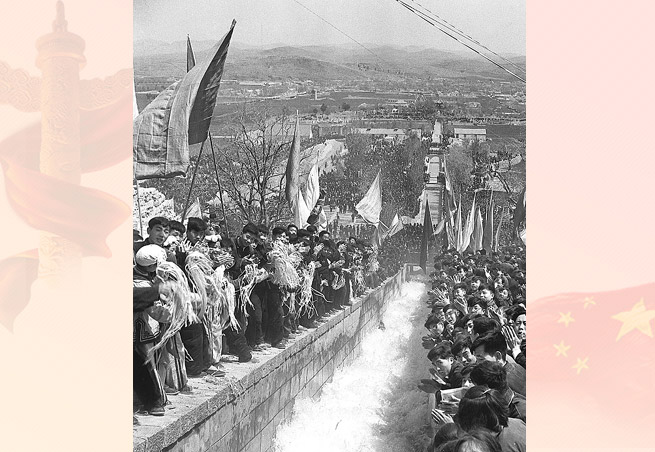 21A gala was held on April 20, 1966 to celebrate the completion of the "Red Flag Canal" project in Henan Province for irrigating the poor and infertile area of Linxian County in the foothills of the Taihang Mountains.
21A gala was held on April 20, 1966 to celebrate the completion of the "Red Flag Canal" project in Henan Province for irrigating the poor and infertile area of Linxian County in the foothills of the Taihang Mountains.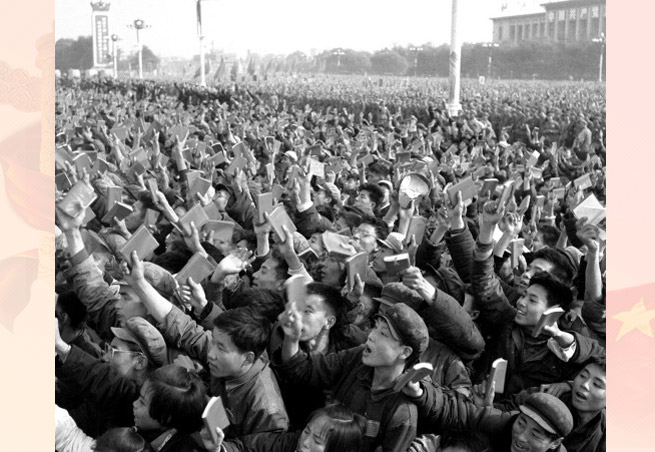 22In 1966, the "Cultural Revolution" in China began. It was a large scale political campaign launched by the late iron man Mao Zedong to eliminate counterrevolutionary elements in the country's institutions and leadership. Law-and-order was shattered. The whole country was in complete upheaval.
22In 1966, the "Cultural Revolution" in China began. It was a large scale political campaign launched by the late iron man Mao Zedong to eliminate counterrevolutionary elements in the country's institutions and leadership. Law-and-order was shattered. The whole country was in complete upheaval.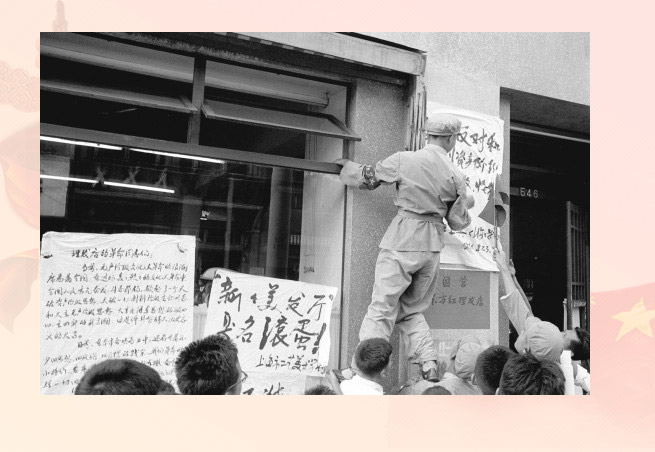 23A Red Guard post Dazibao [big character posters] on walls and windows on August 23, 1966 as the "Cultural Revolution" began.
23A Red Guard post Dazibao [big character posters] on walls and windows on August 23, 1966 as the "Cultural Revolution" began.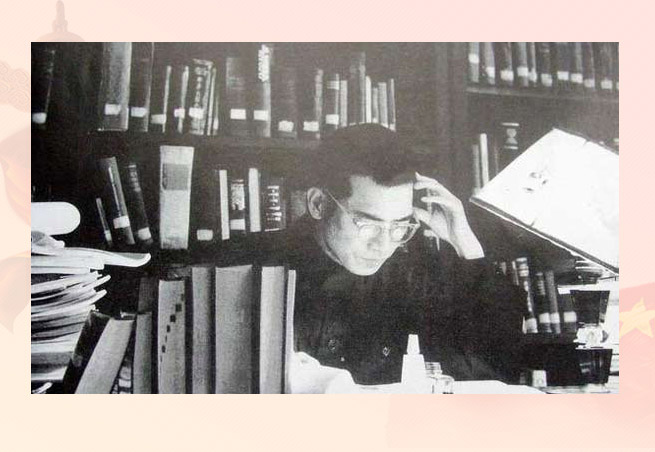 24China's great mathematician Chen Jingrun works on the twin prime conjecture and on Goldbach's conjecture, leading to progress in analytic number theory. In a 1966 paper he proved what is now called Chen's theorem: Every sufficiently large even number can be written as the sum of either two primes, or a prime and a semi-prime (the product of two prime numbers).
24China's great mathematician Chen Jingrun works on the twin prime conjecture and on Goldbach's conjecture, leading to progress in analytic number theory. In a 1966 paper he proved what is now called Chen's theorem: Every sufficiently large even number can be written as the sum of either two primes, or a prime and a semi-prime (the product of two prime numbers).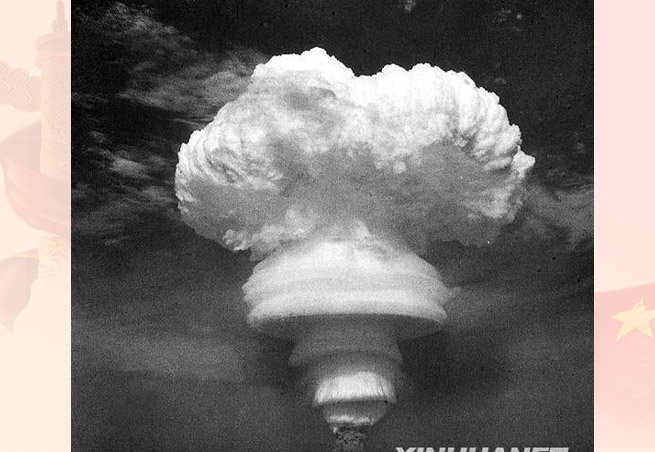 25On June 17, 1967, China tested its first hydrogen bomb. It was conducted only 32 months after China's first atomic test on October 16, 1964.
25On June 17, 1967, China tested its first hydrogen bomb. It was conducted only 32 months after China's first atomic test on October 16, 1964.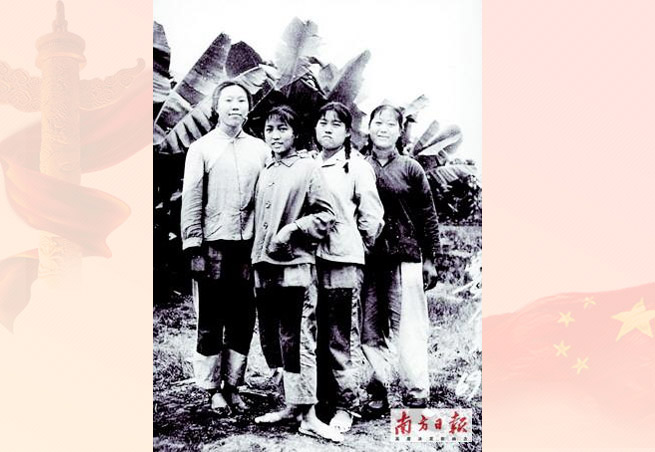 26Thousands of educated young intellectuals from urban areas went to work in the countryside or in mountain areas after the "Cultural Revolution" got underway in answer to Chairman Mao's instruction that they should "learn from the peasants".
26Thousands of educated young intellectuals from urban areas went to work in the countryside or in mountain areas after the "Cultural Revolution" got underway in answer to Chairman Mao's instruction that they should "learn from the peasants".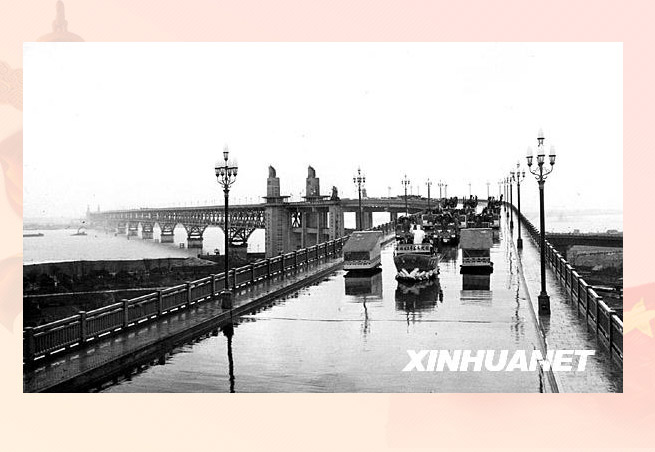 27The newly completed Nanjing Yangtze-River Bridge opened to traffic in 1968.
27The newly completed Nanjing Yangtze-River Bridge opened to traffic in 1968.
Comments